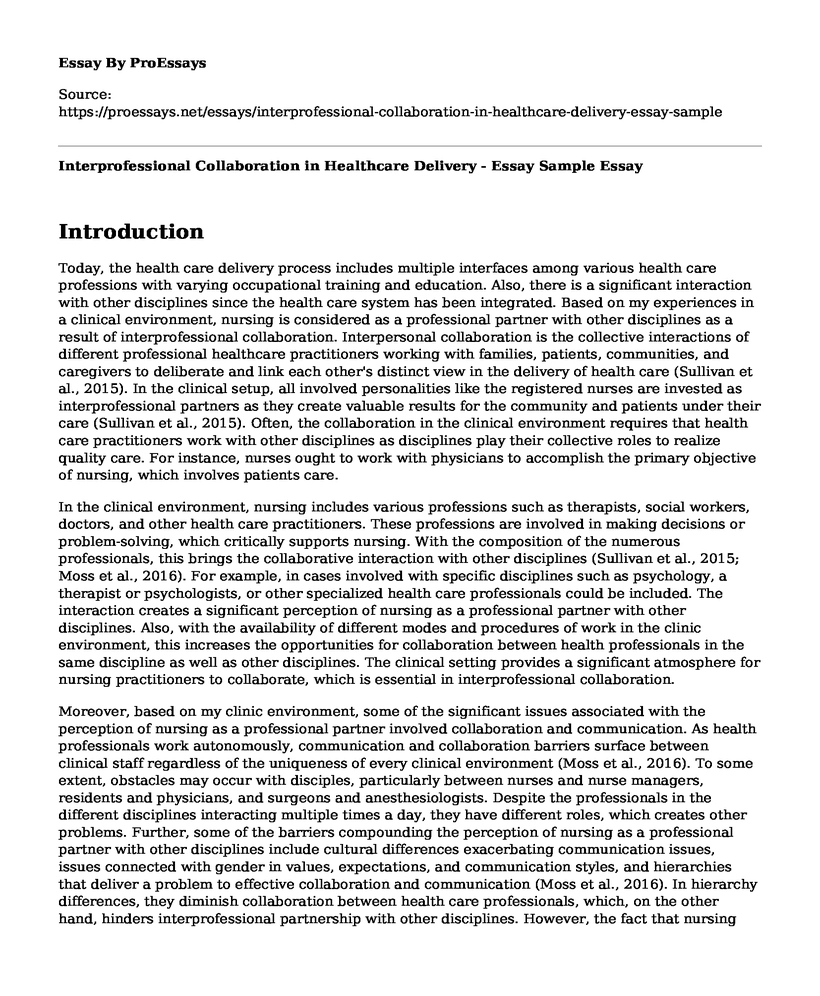Introduction
Today, the health care delivery process includes multiple interfaces among various health care professions with varying occupational training and education. Also, there is a significant interaction with other disciplines since the health care system has been integrated. Based on my experiences in a clinical environment, nursing is considered as a professional partner with other disciplines as a result of interprofessional collaboration. Interpersonal collaboration is the collective interactions of different professional healthcare practitioners working with families, patients, communities, and caregivers to deliberate and link each other's distinct view in the delivery of health care (Sullivan et al., 2015). In the clinical setup, all involved personalities like the registered nurses are invested as interprofessional partners as they create valuable results for the community and patients under their care (Sullivan et al., 2015). Often, the collaboration in the clinical environment requires that health care practitioners work with other disciplines as disciplines play their collective roles to realize quality care. For instance, nurses ought to work with physicians to accomplish the primary objective of nursing, which involves patients care.
In the clinical environment, nursing includes various professions such as therapists, social workers, doctors, and other health care practitioners. These professions are involved in making decisions or problem-solving, which critically supports nursing. With the composition of the numerous professionals, this brings the collaborative interaction with other disciplines (Sullivan et al., 2015; Moss et al., 2016). For example, in cases involved with specific disciplines such as psychology, a therapist or psychologists, or other specialized health care professionals could be included. The interaction creates a significant perception of nursing as a professional partner with other disciplines. Also, with the availability of different modes and procedures of work in the clinic environment, this increases the opportunities for collaboration between health professionals in the same discipline as well as other disciplines. The clinical setting provides a significant atmosphere for nursing practitioners to collaborate, which is essential in interprofessional collaboration.
Moreover, based on my clinic environment, some of the significant issues associated with the perception of nursing as a professional partner involved collaboration and communication. As health professionals work autonomously, communication and collaboration barriers surface between clinical staff regardless of the uniqueness of every clinical environment (Moss et al., 2016). To some extent, obstacles may occur with disciples, particularly between nurses and nurse managers, residents and physicians, and surgeons and anesthesiologists. Despite the professionals in the different disciplines interacting multiple times a day, they have different roles, which creates other problems. Further, some of the barriers compounding the perception of nursing as a professional partner with other disciplines include cultural differences exacerbating communication issues, issues connected with gender in values, expectations, and communication styles, and hierarchies that deliver a problem to effective collaboration and communication (Moss et al., 2016). In hierarchy differences, they diminish collaboration between health care professionals, which, on the other hand, hinders interprofessional partnership with other disciplines. However, the fact that nursing professionals hold common characteristics helps develop the collaboration promoting professional alliances with other disciplines.
Health care practices are associated with collaborative interaction between the involved practitioners. In every clinical department, nurses have to be involved since they are formally trained to work with other specialized professionals in the clinical setup-registered nurses aid in caring for patients (Moss et al., 2016). Hence, as the different disciplines focus on a similar objective, this includes collaboration with nurses. As far as nursing is involved, along with other health care professionals, it can be perceived as a professional partner with other disciplines in the clinic environment.
References
Moss, E., Seifert, P. C., & O'Sullivan, A. (2016). Registered nurses as interprofessional collaborative partners: Creating value-based outcomes. OJIN: The Online Journal of Issues in Nursing, 21(3). https://doi.org/10.3912/OJIN.Vol21No03Man04
Sullivan, M., Kiovsky, R. D., Mason, D. J., Hill, C. D., & Dukes, C. (2015). Interprofessional collaboration and education. American Journal of Nursing, 115(3), 47-54. https://doi.org/10.1097/01.NAJ.0000461822.40440.58
Cite this page
Interprofessional Collaboration in Healthcare Delivery - Essay Sample. (2023, Apr 24). Retrieved from https://proessays.net/essays/interprofessional-collaboration-in-healthcare-delivery-essay-sample
If you are the original author of this essay and no longer wish to have it published on the ProEssays website, please click below to request its removal:
- Thesis Example on Iodine-containing Contrast Drugs
- The Legality and Ethics of the Use of Abortion Pill in Quebec - Essay Sample
- Health Disparities Among Black and Hispanic Populations Essay
- The Future of Nursing Report
- Paper Example on the Disabled: Overcoming Learning Obstacles With Hearing & Sight
- Essay Example on 400K Lives Lost: The Opioid Crisis in America
- Exploring the Centers for Disease Control and Prevention (CDC) - Essay sample







